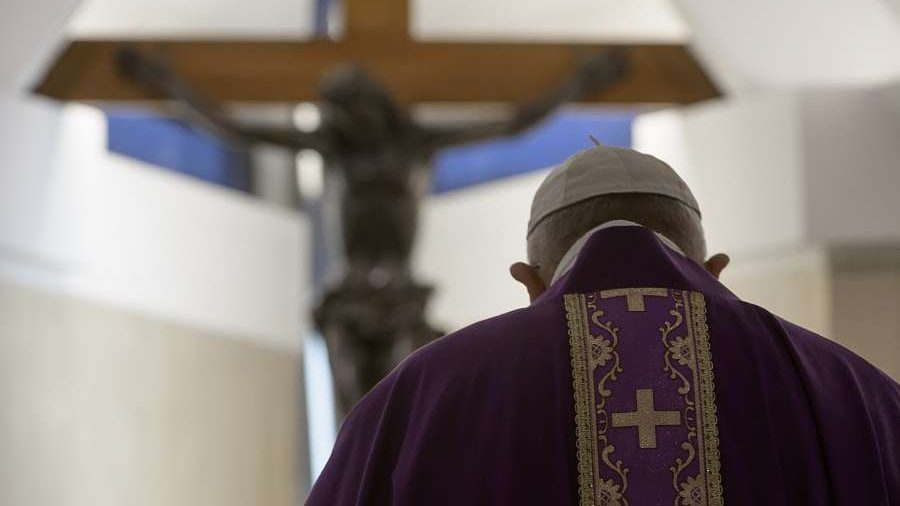Before we commit a sin, there were usually small temptations which we let grow in our soul, eventually making excuses for ourselves and our fall, Pope Francis said during Mass Saturday.
“That process which makes us change our hearts from good to bad, which takes us downhill,” he said April 4, is “something which grows, slowly grows, then infects others and ultimately excuses itself.”
Speaking from the chapel of his Vatican residence, the Casa Santa Marta, the pope advised first seeking forgiveness, and then reflecting on the temptations which preceded your fall into sin, considering also whether you have led others to sin.
“When we find ourselves in a sin, in a fall, yes, we must go to ask the Lord for forgiveness, it is the first [step] that we must take,” he urged.
But then ask yourselves, he said: “How did I come to fall there? How did this process start in my soul? How did it grow? Who have I infected? And how in the end did I justify myself for falling?”
Francis argued that “the devil is cunning” and usually tempts people to sin gradually: “it starts with a little thing, with a desire, an idea grows, infects others and ultimately, justifies itself.”
This process of temptation is illustrated in the day’s Gospel from St. John, he said.
In the Gospel, the chief priests and the Pharisees have met to discuss Jesus, who is causing them anxiety because through his signs, many Jews have begun to believe in him, and they feel they must do something.
The high priest Caiphas said Jesus should be killed, defending the decision with his prophecy, saying “it is better for you that one man should die instead of the people.”
Quoting the Gospel, Francis said “from that day therefore they decided to kill him.”
He explained that the Pharisees and chief priests justified killing Jesus to themselves, because if they did not, the occupying Romans “will destroy our temple and our nation,” but what brought them to this decision was a gradual process that “began with small concerns in the time of John the Baptist and then ended in this assembly.”
After this meeting, “everyone went home quietly,” the pope noted. They felt this was the decision they had to make.
This, the pope said, is “a figure of how temptation operates in us.”
Before Mass, Francis had noted that in difficult times, such as the present coronavirus pandemic, people are given the opportunity to do good.
But there are also plenty of people, he said, who take advantage of the moment for their own profit.
“Let us pray today that the Lord give us all a righteous conscience, a transparent conscience, which can be seen by God without being ashamed,” he urged.
In his homily, the pope recalled once again that behind every sin there is temptation, “which started small, which has grown.”
“All of us, when we are overcome by temptation, end up calm, because we have found a justification for this sin, for this sinful attitude, for this life not according to the law of God. We should have the habit of seeing this process of temptation in us,” he advised, adding that “the Holy Spirit enlightens us in this inner knowledge.”

